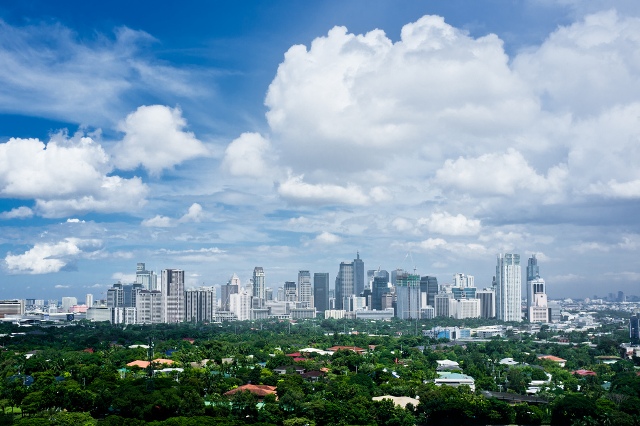Economy grows 6.5% in Q2

MANILA, Philippines - The Philippine economy grew at a sizzling pace in the second quarter, topping expectations as a government-led construction boom and an extended rebound in the farm sector took some of the sting off a peso wallowing at 11-year lows.
The Southeast Asian nation is the second-fastest growing economy in Asia after China, though some analysts cautioned that activity could wane if foreign investors are scared off by President Duterte’s deadly war on drugs.
Gross domestic product rose 6.5 percent in the second quarter from a year earlier, the national statistics agency said yesterday, picking up from the 6.4 percent pace in the first quarter.
“Our growth momentum is on track and that we would sustain our pace for the rest of the year as we continue to lay down the foundation of a comfortable life for all through increased investments in infrastructure and social protection,” Presidential Spokesman Ernesto Abella said in statement.
While the 6.5 percent growth during the second quarter is lower that the 7.1 percent expansion in the same period last year, Malacañang regarded it as a welcome development.
“This figure, which falls within the full-year target growth of our economic managers, puts us as one of the fastest growing major economies in Asia,” Abella said.
“We are well on track to meeting our full-year target growth of 6.5-7.5 percent,” Economic Planning Secretary Ernesto Pernia told reporters at a briefing.
Like its regional peers, the Philippines has benefited from an improvement in global demand, with exports up nearly 14 percent in the six months to June.
Household consumption grew at slightly faster annual pace of 5.9 percent in the second quarter compared with 5.8 percent in the first, while government spending jumped 7.1 percent in a dramatic rise from the revised 0.1 percent gain in the March quarter.
“The sequential increase implies that the economy is gaining momentum,” said ANZ economist Eugenia Fabon Victorino in a note to clients.
Inclusive growth
The latest growth figures indicated the effectiveness of the Duterte administration’s economic strategy anchored on massive public spending on infrastructure and social services, according to Finance Secretary Carlos Dominguez.
“This is solid proof that the year-old administration has been making the right moves at the right time in pursuit of President Duterte’s socioeconomic agenda on high and inclusive growth,” Dominguez said.
Domiguez said the growth in public spending in the second quarter shows the government’s economic strategy has started to “pick up steam.”
Data from the Department of Budget and Management (DBM) showed disbursements in the second quarter rose 13.6 percent to P690.7 billion from the P629.8 billion recorded in the same period last year.
Dominguez expressed optimism this momentum will be sustained and continue to drive economic growth in the country.
“We are optimistic that the accelerated state spending and project implementation would keep the Philippines in the club of Asia’s fastest-growing economies as it sustains the momentum for the government-set expansion rate of 6.5 to 7.5 percent this year and a higher 7 to 8 percent in 2018 and onwards,” he said.
Amid these developments, Dominguez said he is hoping the Senate would help the government meet its growth targets through the full passage of the Tax Reform for Acceleration and Inclusion Act.
“Now is the right time for the government to spend big on infrastructure, human capital and social protection as we take full advantage of both our demographic strengths and the opportunities for inclusive, investment-driven growth presented by soft global oil prices and a low-interest rate regime, our investment-grade credit ratings and benign debt conditions, and marked improvements in the ease of doing business in the country,” he said.
Peso Woes
Manila aims to lift growth to as much as eight percent during Duterte’s term through a six-year, $180 billion Build Build Build infrastructure program.
All the same, the outlook is not without risks, according to Capital Economics senior economist Gareth Leather who said that Duterte’s controversial war on drugs has started to undermine investor sentiment.
The security crisis in the southern city of Marawi is also a “potential risk to the near-term economic outlook,” as it could deter foreign direct investment into the country, said Rajiv Biswas, Asia Pacific Chief Economist at IHS Markit.
Thousands of people have been killed in the anti-drugs campaign, Duterte’s signature policy, since it was launched on June 30 last year, with the intensity of the crackdown alarming the international community.
Duterte has repeatedly said solving the drugs scourge was necessary for the economy to prosper.
Investors were also focused on the peso following a sharp slide since July though it was steady after the GDP report.
Policymakers have sought to soothe frayed nerves in the foreign exchange market after the peso hit an 11-year low, saying currency movements do not reflect the underlying strength of the local economy.
Bangko Sentral ng Pilipinas Governor Nestor Espenilla said the central bank was “ready to adopt policies” to keep prices and financial markets stable.
The central bank has kept policy settings steady since a 25-basis-point hike in September 2014.
A construction boom in the Philippines has contributed to the peso weakening amid a recent surge in capital goods imports, setting the nation on course to book its first annual current account deficit in 15 years.
The infrastructure drive saw public construction surge 12 percent in the second quarter from 1.9 percent in the first three months of the year, but private building work slowed to 4.7 percent from 13.0 percent in the March quarter. — Czeriza Valencia, Alexis Romero, Mary Grace Padin, Reuters
- Latest
- Trending


























